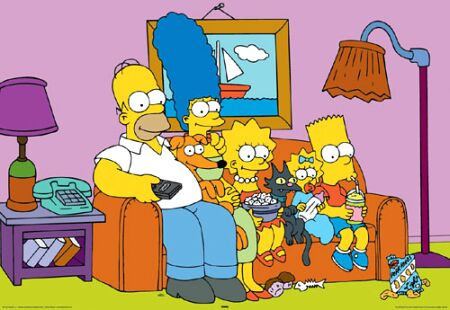Film Adaptation
 The Simpson family (and pets) sitting on their favourite couch.
The Simpson family (and pets) sitting on their favourite couch.When seeing a movie for the first time you may think to yourself, "Wow this film is really well written!" or "This is a great story!" Although the script may have been entirely envisioned and created by the screenwriter, there is a good chance that you are looking at the result of a film adaptation.
Film adaptation is the process of taking a written work, such as a novel or short story, and re-writing it for the big screen. Many great movies are the results of adapting equally great novels. A quick browse of our earlier Moment In History article, titled "Great Historical Films", will show many of these monumental movies started their lives as written works. While the most common type of film adaptation is novel to screenplay, others include the use of non-fiction works, (auto)biographies, plays, and also comic book and television adaptations.
Here are some famous examples of each:
- Novel/Short-Story - The Exorcist, The Lord of the Rings
- (Auto)Biographies - Braveheart, Truman, Ghandi
- Plays - Hairspray, Hamlet, Mamma Mia
- Comic Books - Superman, Spider-Man, Batman
- Television - Miami Vice, The Simpsons, The X-Files
Although screenwriters usually try to remain faithful to the original work's storyline, more often than not, the movie does not live up to the original and falls flat. Sometimes this is not the screenwriter's fault, but the fact that there is just too much story to be adapted, or in the case of a novel, the actions cannot be literally translated to film. If failure can be so great than why are so many movies produced from the seeds of adaptations then? The answer is simply because when these movies do succeed they are spectacular films to watch and incredibly lucrative for the film studios. Some of the movies listed above are examples of this.
Often choices of who or what source gets adapted is based on commerciality and popularity. For instance, every Shakespeare play has been adapted to film, and some, such as Romeo and Juliet or The Merchant of Venice, have been adapted many times. Sometimes multiple adaptations of the same source material such as Shakespeare plays can result in very different films.
One of the most adapted novelists is Stephen King. Almost every book and many short stories written by Stephen King have been made into movies. Some of these films have had critical and commercial success, such as The Dead Zone, The Shawshank Redemption and The Mist. Other King movies, such as Maximum Overdrive or Christine, have been relegated to the bargain bin in video shops.
Occasionally, lesser known works or authors are adapted in hopes the "freshness" of an unfamiliar source will make for a popular film. There are even times where the screen writing and adaptation process is mocked or poked fun at as in the Kaufman brothers movie Adaptation.
So the next time you read a good novel or other common adaptation source, think how that source could be adapted to film, or if such an adaptation is even feasible. Sometimes it just takes the right timing and ingredients to make an adaption a truly great film. Take the example of The Lord of the Rings Trilogy; these J.R.R. Tolkien novels were considered to be inadaptable to live action film, yet Peter Jackson conquered that obstacle and has created three movies that now all find themselves in the top twenty grossing movies of all time, as well as on many critics great movie lists!
